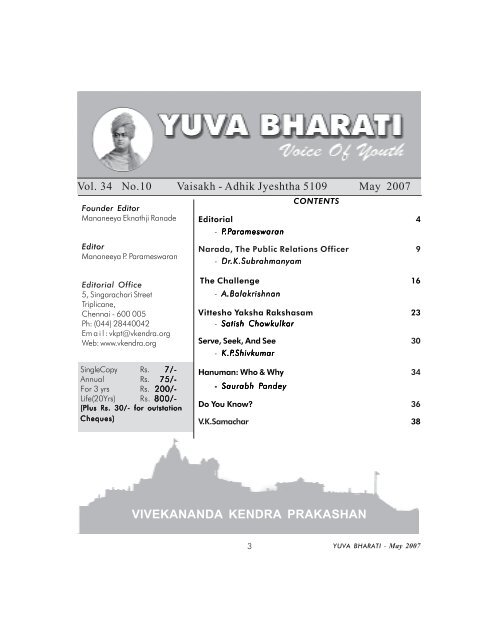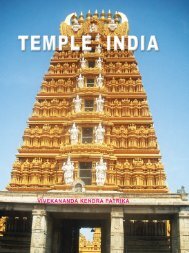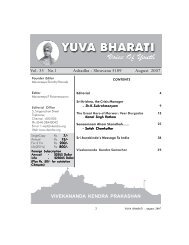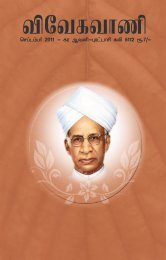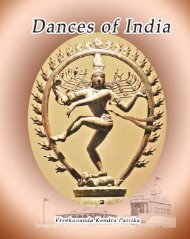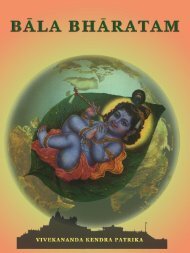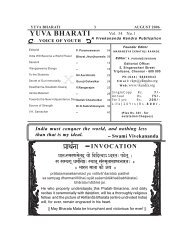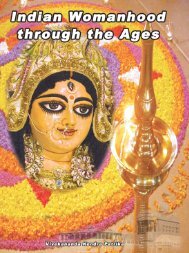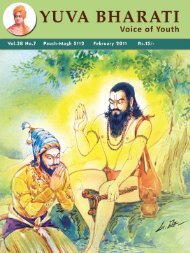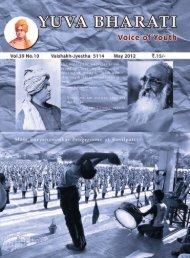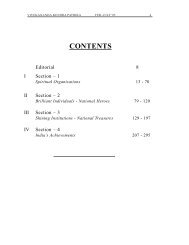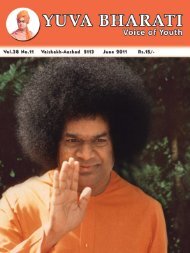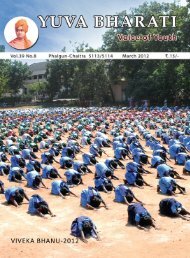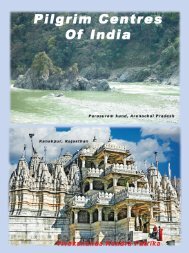May 2007 - Vivekananda Kendra Prakashan
May 2007 - Vivekananda Kendra Prakashan
May 2007 - Vivekananda Kendra Prakashan
Create successful ePaper yourself
Turn your PDF publications into a flip-book with our unique Google optimized e-Paper software.
Vol. 34 No.10<br />
Founder Editor<br />
Mananeeya Eknathji Ranade<br />
Editor<br />
Mananeeya P. Parameswaran<br />
Vaisakh - Adhik Jyeshtha 5109<br />
CONTENTS<br />
<strong>May</strong> <strong>2007</strong><br />
Editorial 4<br />
- P.P<br />
.Parameswaran<br />
Narada, The Public Relations Officer 9<br />
- Dr.K<br />
.K.Subrahmanyam<br />
.Subrahmanyam<br />
Editorial Office<br />
5, Singarachari Street<br />
Triplicane,<br />
Chennai - 600 005<br />
Ph: (044) 28440042<br />
Email:vkpt@vkendra.org<br />
Web: www.vkendra.org<br />
SingleCopy Rs. 7/-<br />
Annual Rs. 75/-<br />
For 3 yrs Rs. 200/-<br />
Life(20Yrs) Rs. 800/-<br />
(Plus Rs. 30/- for outstation<br />
Cheques)<br />
The Challenge 16<br />
- A.Balakrishnan<br />
Vittesho Yaksha Rakshasam 23<br />
- Satish Chowkulkar<br />
Serve, Seek, And See 30<br />
- K.P<br />
.P.Shivkumar<br />
.Shivkumar<br />
Hanuman: Who & Why 34<br />
- Saurabh Pandey<br />
Do You Know 36<br />
V.K.Samachar 38<br />
VIVEKANANDA KENDRA PRAKASHAN<br />
3<br />
YUVA BHARATI - <strong>May</strong> <strong>2007</strong>
kmR{ykmR y> pZyedkmRi[ c kmR y><br />
s ÉuiÏmaNmnu:ye;u s yu´ k«TõkmRk«t!<br />
Bhagavad Gita - 4 : 18<br />
He who finds inaction in action, and action in inaction, he is the wise one among<br />
men; he is engaged in yoga and is a performer of all actions!<br />
Editorial<br />
YOUTH AND VISION<br />
Human beings are the crowns of<br />
evolution and the youths are the crestjewel.<br />
It is the vision of the youth and<br />
their will that will shape the future of<br />
humanity.<br />
Natural evolution has been going on<br />
for many millennia. Many species have<br />
come into being; some have fallen by the<br />
way side and become extinct, unable to<br />
cope with the challenges. The apparently<br />
endless procession is on the march, until<br />
humanity has taken over. But there is a<br />
difference. So far evolution had been<br />
blind, groping its way under external<br />
constraints and compulsions. It was not<br />
a consciously and deliberately willed or<br />
planned process. It was Nature that was<br />
in command. The vagaries of nature led<br />
evolution through many blind alleys and<br />
zigzag ways. Nature was not a<br />
compassionate mother; her teeth and<br />
claws were red with blood. A host of<br />
species and their ultimate product, man,<br />
remain on the scene. It is not all a smooth<br />
and friendly co-existence. There is<br />
struggle for survival all-round. Man is<br />
at the head carrying this proud and<br />
flaming torch.<br />
But the race is nowhere near the end.<br />
Like in the case of the previous species,<br />
struggle is the law for men also. Struggle<br />
and competition still hold sway. Not that<br />
there were no saner voices of wisdom in<br />
man’s history. There were many sages<br />
and saints, prophets and protagonists of<br />
various religions who have tried to show<br />
YUVA BHARATI - <strong>May</strong> <strong>2007</strong><br />
4
the path of peaceful survival. Scientists<br />
and researchers have worked hard to<br />
produce a new and happy world order.<br />
Politicians and statesmen have also been<br />
ambitiously trying to stamp humanity’s<br />
forehead with their insignia. But with all<br />
that the human race is still tenuously<br />
perched on the precipice of an uncertain<br />
future. The latest studies demonstrate<br />
that man is not secure or self-assured in<br />
his hope for survival. The monstrous<br />
destructive weaponry, the mindless<br />
exploitation of nature leading to<br />
unbearable pollution and global<br />
warming-all point to the possibility of the<br />
total or partial extinction of humanity,<br />
the crown of creation.<br />
But those species, which perished on<br />
their march forward, had no capability<br />
to choose alternatives. They were helpless<br />
victims. But man is different. He is a selfconscious<br />
being. He can decide for<br />
himself. He can learn from history and<br />
avoid mistakes. He has the capacity to<br />
device ways and means to cope with the<br />
confronting threats and calamities and<br />
to steer clear of the dangerous currents<br />
and undercurrents. But will he show the<br />
wisdom and foresight to do it is the<br />
question. Often it appears that most of<br />
the leadership that is now in command<br />
in various countries are happier with the<br />
familiar pattern of inherited “mutually<br />
– assured – destruction.” Humanity is<br />
not safe in their hands. A new generation<br />
of leadership is the need of the hour.<br />
Where will it come from Obviously from<br />
the youth- youth with clear vision and<br />
determined will. They can lead humanity<br />
to a bright future. Only they can.<br />
Too wide a canvas for the youth to<br />
paint their dreams It would appear so.<br />
But not necessarily, for a world which<br />
is everyday shrinking into a global<br />
village, where people of one continent rub<br />
shoulders with those of others everyday.<br />
World is a global village, where Coca<br />
Cola and McDonalds invite you from the<br />
next street, where supermarkets<br />
displaying the most fascinating<br />
consumer items are opening up almost<br />
every other day. You are forced to think<br />
globally or face isolation and destruction.<br />
Think globally and act locally is the<br />
dictum for the day. Youth cannot and<br />
should not shy away from this emerging<br />
scenario.<br />
Indian youth have a great stake in this<br />
critical juncture; they can create history,<br />
if they will. India has got the largest<br />
youth population in the world. The<br />
youth of India can play a crucial role in<br />
shaping up the future of the country and<br />
also the world. India is in a sense the<br />
youngest country in the world with the<br />
5 YUVA BHARATI - <strong>May</strong> <strong>2007</strong>
most ancient and most durable<br />
civilization. She has survived the most<br />
threatening challenges and now stands<br />
poised to take on more. Youth must play<br />
their role, not only for the sake of India,<br />
but for the rest of the world as well. In a<br />
world where the intelligentsia of the most<br />
“advanced” nations speak about the<br />
inevitability of “clash of civilizations”<br />
and “conflict of religions”, it is only<br />
India with an unblemished history of<br />
harmony and co-existence among<br />
cultures and civilizations that can show<br />
the way. It is only India, even in the most<br />
ancient days, proclaimed to the world<br />
that “Truth is one, but wise men call it<br />
by various names”. India has given<br />
asylum to the persecuted refugees of<br />
various countries and religions – the<br />
Jews and Parsis are examples – in her<br />
bosom. India can, and must play, must<br />
provide the healing touch to the<br />
wounded world. This is a historical duty<br />
handed down to the young generations<br />
right from the ancient times.<br />
But for this to happen we have to<br />
remake India. ‘We’ means the youth of<br />
today standing on the shoulders of yester<br />
years. For this they must equip<br />
themselves, physically, emotionally,<br />
intellectually and spiritually. More over,<br />
along with all these equipments they<br />
should also have a grand vision of the<br />
future. They do have the potentiality<br />
and creativity; they should express it,<br />
and they want to express it. That is why<br />
their hearts were thrilled, and they have<br />
started responding to the call of our<br />
visionary president, A. P.J. Abdul<br />
Kalam, when he spoke about “Vision of<br />
India 2020”. Youth of India must<br />
internalize this vision and develop<br />
powerful “ wings of fire” to lead the<br />
country to this glorious vision.<br />
What is a vision Vision is not day<br />
dreaming, a futile exercise of time and<br />
energy. Vision is defined as “the ability<br />
to see the invisible”. It is the ability to<br />
see beyond the obvious. Dreams are<br />
involuntary and nebulous; they seldom<br />
materialize. Vision is a part – projection<br />
of your soul, the result of your intense<br />
contemplation and commitment. It can<br />
be materialized. The difference between<br />
achievers and non-achievers is that the<br />
former has vision whereas the later has<br />
only eyesight. To have eyesight without<br />
vision is worse than having no eyesight.<br />
Poor eyes limit your sight. But poor<br />
vision limits your actions. So a clear<br />
vision is the need before every youth,<br />
every society, and every nation.<br />
But vision is a distant goal. It is like<br />
the pole star or the mount Kailas. To<br />
reach it requires thorough knowledge of<br />
YUVA BHARATI - <strong>May</strong> <strong>2007</strong><br />
6
the way, the hurdles on the way and the<br />
knowledge as to how they could be<br />
overcome. This knowledge has to be<br />
acquired. Without that you will be<br />
groping in the dark, encountering<br />
avoidable obstacles and in the end<br />
courting disaster. The way is as<br />
important as the goal. As Swami<br />
<strong>Vivekananda</strong> puts it, once you have fixed<br />
the goal you may concentrate on the<br />
road. Ultimately you are bound to reach<br />
the goal. It is not necessary to waste your<br />
energy by dwelling upon the glories and<br />
laurels of achievement. They are the<br />
flowers that will inevitably blossom,<br />
once you stick to the path and proceed<br />
unswervingly.<br />
But even that is not enough. The most<br />
important factor is that you should set<br />
your foot on the road and with<br />
determination move ahead. The first step<br />
is crucial. There is a Chinese proverb “<br />
Even the longest march begins with the<br />
first step”. Step after step, untiringly,<br />
with dogged perseverance you have to<br />
march day after day, year after year, till<br />
you catch the prize, the crown of your<br />
success.<br />
This is possible for the youthsyouthful<br />
in body, mind and spirit. Listen<br />
to the words of Swami <strong>Vivekananda</strong>, the<br />
symbol of eternal youth “Young men of<br />
India, my hope is in you. Will you<br />
respond to the call of your nation Each<br />
one of you has a glorious future if you<br />
dare believe me. Have a tremendous faith<br />
in yourselves, like the faith I had when I<br />
was a child, and which I am working out<br />
now. Have that faith, each one of you,<br />
in yourself, that eternal power is lodged<br />
in every soul, and you will revive the<br />
whole of India. Aye, we will then go to<br />
every country under the sun, and our<br />
ideas will before long be a component of<br />
the many forces that are working to make<br />
up every nation in the world. We must<br />
enter into the life of every race in India<br />
and abroad; we shall have to work to<br />
bring this about. Now for that, I want<br />
young men. “It is the young, the strong<br />
and healthy, of sharp intellect, that will<br />
reach the Lord,” say the Vedas. This is<br />
the time to decide your future – while<br />
you possess the energy of the youth, not<br />
when you are worn out and jaded, but<br />
in the freshness and vigour of youth.<br />
Work; this is the time, for the freshest,<br />
the untouched, and unsmelled flowers<br />
alone are to be laid at the feet of the lord,<br />
and such he receives. Rouse yourselves<br />
therefore, for life is short”.<br />
Poets are great visionaries. But not<br />
always very practical. Youth of India<br />
today need a combination of grand vision<br />
and concrete action. Nobel laureate<br />
7 YUVA BHARATI - <strong>May</strong> <strong>2007</strong>
Vishwa Mahakavi Ravindra Nath<br />
Tagore has given us probably the<br />
grandest vision that any Indian youth<br />
can have. Let me quote as the concluding<br />
words for this essay his famous Vision<br />
of free India: -<br />
“Where the mind is without fear and<br />
the head is held high<br />
Where knowledge is free<br />
Where the world is not broken up into<br />
fragments<br />
By narrow domestic walls<br />
Where the words come out from the<br />
depth of truth<br />
Where tireless striving stretches its<br />
arms towards perfection<br />
Where the clear stream of reason has<br />
not lost its way<br />
Into the dreary desert sand of deaf<br />
habit<br />
Where the mind is lead forward by thee<br />
Into ever-widening thought and action<br />
Into that heaven of freedom, my father,<br />
let my country awake.”<br />
The question today is are we really<br />
without fear Is knowledge free<br />
Is the world not fragmented Do<br />
words come from the depth of truth Has<br />
reason not lost its way<br />
Is India occupying, among the comity<br />
of nations, the position she deserves by<br />
virtue of her natural and human<br />
resources, cultural heritage and talents<br />
Is she a successful player in the<br />
international politics or is she being<br />
slowly pushed into being a pawn in the<br />
chessboard of international diplomacy<br />
Is the glow on the face of Metropolitan<br />
India genuine or is it painted Or is it<br />
even tainted by the blood and tears of the<br />
suicide–prone farmers of rural India<br />
With Kailas in the North already lost to<br />
us, with Arunachal in the East, the land<br />
of rising sun coming under the cloud of<br />
border disputes, with Kashmir in the<br />
West under perpetual turmoil and the<br />
Mythological Ramasethu near<br />
Rameswaram in the South being<br />
wantonly destroyed by our planners, can<br />
we call India a safe, self-conscious and<br />
self-respecting nation<br />
It is for the present generation of<br />
India’s Youth to find positive answers<br />
to these great questions. Let us always<br />
remember Pandit Nehru’s oft- repeated<br />
quote: - “ Who lives if India dies And<br />
who dies if India lives”<br />
P.Parameswaran<br />
YUVA BHARATI - <strong>May</strong> <strong>2007</strong><br />
8
NARADA, THE PUBLIC RELATIONS OFFICER<br />
Dr. K. Subrahmanyam<br />
There is perhaps no story in mythology<br />
without Narada playing an effective role<br />
silently, indirectly and sometimes directly as<br />
well. There cannot be an institution or<br />
organization worth its name sans a public<br />
relations officer playing a powerful role<br />
without assuming prominence and without<br />
projecting himself or herself as the top person.<br />
Without Narada there is no progress of events<br />
in the mythological stories. Nor is there<br />
information or publicity without him.<br />
Information, guidance, publicity and<br />
propaganda are the primary duties of a public<br />
relations officer. Media cannot replace a<br />
PRO. Any number of signboards and notice<br />
boards, pamphlets and advertisements<br />
cannot substitute a good PRO. If<br />
advertisements can attract consumers, there<br />
is no need for salesmen and sales<br />
representatives. Advertisements are only to<br />
inform the public about the existence and<br />
availability of a commodity. Rarely does a<br />
consumer believe the advertisement. It is<br />
because of the convincing ability of the sales<br />
persons and representatives that the goods<br />
are bought or sold. And this mission of<br />
convincing publicity is very often performed<br />
by a PRO in any institution. Depending upon<br />
the needs and<br />
mindsets of the<br />
people, PRO<br />
presents the<br />
picturesque<br />
description of the<br />
articles or<br />
amenities<br />
available in the<br />
company or<br />
organization. The great task of bringing the<br />
two different people such as buyer and seller,<br />
individual and institution, user and supplier is<br />
very often performed by the PRO. The<br />
efficiency of PRO is highly essential in any<br />
institution. PROs can help or harm the<br />
growth of an organization.<br />
Rukmini is the daughter of Bhishmaka,<br />
king of Vidarbha. She is worthy of Lord<br />
Krishna as his bride. She has not yet heard<br />
about him. She is to be informed about<br />
Krishna. Their wedding is for the welfare of<br />
all. Narada, the cosmic PRO has the great<br />
art and responsibility to bring them together<br />
in a sacred wedlock. He therefore visits the<br />
place of the bride and gives her a detailed<br />
account of Sri Krishna – His features,<br />
9 YUVA BHARATI - <strong>May</strong> <strong>2007</strong>
fairness, divine traits, grace and grandeur.<br />
And because of his convincing description,<br />
she sends her application to Krishna. The<br />
first love letter is written by Rukmini to<br />
Krishna because of PRO Narada’s effective<br />
role play.<br />
Goddess Bhoodevi wanted her son to be<br />
protected permanently in spite of his evil<br />
deeds. Her husband and God may not grant<br />
her the needed boon. Then again PRO<br />
Narada went to her rescue and told her “Ma,<br />
your husband will be fresh and pleasing in<br />
the early hours of the day. He grants all<br />
prayers in the morning when he is fresh from<br />
the bed after the night’s rest. You go to him<br />
with a gentle face and request him for the<br />
boon and you will have it granted”. The way<br />
to success is suggested by the unfailing PRO.<br />
Even the spouse does not know when the<br />
husband would be favourable. PRO knows<br />
when, where and how we must proceed for<br />
the successful completion of our endeavour.<br />
And Bhoodevi succeeded. Vishnu granted<br />
her the needed boon and said, “Except in<br />
your hand, your son Narakasura has no<br />
death. You can rest in peace”. Later, when<br />
the atrocities of the demon are on the ascent,<br />
she unknowingly, as Satyabhama puts an end<br />
to the life of Naraka. Even that is dexterously<br />
worked out by Narada for everybody’s well<br />
being. A PRO should strive for public<br />
welfare. No action of Narada has ever<br />
resulted in wickedness becoming victorious<br />
at the ultimate end.<br />
In service organizations PROs have a<br />
major role to play. At the very first sight, the<br />
potentialities of the visitors are to be<br />
identified. Some of the visitors may be of<br />
immense use to the organization either<br />
monetarily or otherwise. The hidden abilities<br />
have to be brought out for everybody’s<br />
benefit. Dhruva was a young boy of<br />
extraordinary potentialities. On account of a<br />
setback at house, he left for the woods. He<br />
should be properly guided. Narada the<br />
cosmic PRO stopped him on the way,<br />
showered affection and gave him the sacred<br />
spiritual formula for the inner self to attain<br />
fulfilment of life. It is like a PRO guiding the<br />
potential donor or student to the MD or<br />
Principal. Dhruva followed the PRO’s<br />
instructions and attained God realization or<br />
obtained Narayana Darshan. Sometimes<br />
PROs may have to go to the rescue of the<br />
misguided visitors, applicants, investors and<br />
others. Alertness and appropriate action are<br />
the essential traits of a PRO. Hiranyakasipu<br />
went for Tapas at a far away place. His wife<br />
was pregnant. When she was alone, she was<br />
taken captive by Indra. On the way, Narada<br />
accosted them and released her from the<br />
abductor. She was taken to his own Ashram.<br />
He gave her protection. It was in his ashram<br />
that the grateful lady peacefully gave birth to<br />
Prahlada, a born devotee. The foresight and<br />
timely intervention of Narada are<br />
praiseworthy. A PRO identifies himself with<br />
the organization that he represents. Other<br />
employees may work during a particular<br />
YUVA BHARATI - <strong>May</strong> <strong>2007</strong><br />
10
period of the day. PRO is a PRO all the<br />
twenty four hours. Even while he is away<br />
from his office, he plays the role of a PRO.<br />
As mother is a mother all the time, teacher is<br />
a teacher all the time, PRO is a PRO all<br />
through. He and the organization he<br />
represents, are inseparable.<br />
As a catalytic agent PRO has to quicken<br />
the process of progress. Also, he has to<br />
trigger off the challenges to enable the<br />
concerned people to rise to the occasion. An<br />
ideal PRO cannot remain inactive. Nor does<br />
he allow anybody to be meek and mild<br />
without enough dynamism for everybody’s<br />
growth. Savitri is a pious girl of strong will in<br />
mythology. She has fallen in love with a young<br />
person called Satyavan. Narada has come<br />
to know of her resolve to marry the chosen<br />
lover. He therefore tells her about the<br />
bridegroom’s destined death within a year<br />
after marriage. It is not to frighten her that he<br />
has foretold the calamity. Nor is it his<br />
intention to alter her resolve. It is with the<br />
purpose of fructifying her will power that<br />
Narada has played the role of an astrologer.<br />
One can with faith and self-confidence,<br />
knowledge and wisdom, love and devotion<br />
conquer fate, alter destiny. We make our<br />
destiny. Life is not by chance, but by choice.<br />
So is our future, not a chance but a choice of<br />
our strong will. That will can be strengthened<br />
successfully if we are informed in advance of<br />
the impending adverse circumstances. PRO<br />
only does a favour by telling us about the<br />
probable losses or difficulties or<br />
disadvantages. He does not deter us, but<br />
strengthens our determination. Savitri is able<br />
to direct her every step to encounter fate and<br />
conquer it. And she has ultimately<br />
succeeded. Her husband is saved from the<br />
noose of death. The role of a PRO is to<br />
strengthen the imagination and foresee the evil<br />
consequences as well. He is cautious and as<br />
an embodiment of alertness cautions all<br />
against the probable difficulties, defects and<br />
disadvantages which are in store.<br />
Just as righteousness is to be protected,<br />
fostered and fructified, evil too should be<br />
driven to its fatal end at the earliest. Unless it<br />
is ripe, bad will not burst and collapse to its<br />
extinction. Narada helps the good to be<br />
guarded by the inner strength and hastens the<br />
evil minded people to commit error after error<br />
so that they work out their bad karma soon.<br />
The devil should die soon. Therefore he<br />
won’t allow the demonic people to be<br />
superficially good. He will either change them<br />
to be good permanently or expose their evil.<br />
Kamsa was afraid of death at the hands of<br />
his sister’s eighth child. Therefore he decided<br />
to kill her even before she bore any child.<br />
But her husband persuaded him to desist from<br />
the hienous crime of killing a sister when she<br />
was just married. He offered to bring all the<br />
children one after the other to be killed by<br />
Kamsa. The cruel Kamsa agreed to spare<br />
his sister’s life. Later, when the first born baby<br />
was offered by the father to be slain by<br />
11 YUVA BHARATI - <strong>May</strong> <strong>2007</strong>
Kamsa, the monster of fear and terror was<br />
unable to believe his own eyes “Will there be<br />
a person so truthful to welcome death to his<br />
own offspiring”. He admired the father’s<br />
integrity and said “Sir, I am happy to note<br />
your honesty. According to the prediction, I<br />
will be killed not by this child but by the<br />
eighth child. So you can take back the baby.<br />
Be happy with your wife who is no other than<br />
my sister. But mind you, don’t forget to bring<br />
the eighth baby”. The child and the parents<br />
thus were spared. Now it is the turn of<br />
Narada to play the role of a catalytic agent<br />
to quicken the process of evil eradication –<br />
Kamsa should be slain and he should work<br />
out his karma in such a way that he deserves<br />
to be killed by Krishna. Kamsa must be<br />
made to commit crime after crime. If he does<br />
not, his death will be delayed and he will be<br />
more cruel elsewhere in worse ways. Also,<br />
the crimes hitherto committed are so<br />
innumerable that a few good deeds cannot<br />
save him from the capital punishment.<br />
He may, by his streak of good gestures,<br />
at the most postpone for a while the gallows<br />
waiting for him. Therefore Narada went to<br />
him with the purpose of making him a hard<br />
core criminal so that he (Kamsa) could soon<br />
be slain by Krishna. He told Kamsa “My dear<br />
king, the prediction, no doubt, is that you will<br />
be killed by your sister’s eighth child. The<br />
first child will be the eighth child if counted<br />
from the last child, if she bears eight children.<br />
The mode of counting has not been told by<br />
the voice of the invisible form that foretold<br />
your death. Therefore, it is better to kill all”.<br />
The suggestion of Narada appeared to be<br />
logical to the demon. The spared child was<br />
brought back and killed. Since then all the<br />
children were killed. This heartless massacre<br />
alone has quickened Kamsa’s doom. Narada<br />
has by his diplomatic logic worked out the<br />
cessation of evil and the consequent<br />
establishment of righteousness.<br />
Spotting out the hidden spark, a PRO has<br />
to sow the seeds of a righteous ideal and<br />
follow it up. As and when guidance is<br />
required, appropriate help and information<br />
must be provided. Ratnakar was initially a<br />
robber. But in him there was divinity and it<br />
was spotted out by Narada. For its full<br />
blossom, appropriate guidance too was given.<br />
When Ratnakar grew to be a great sage<br />
called Valmiki, Narada gave him the<br />
information about the exemplary person Sri<br />
Ram. The sage then composed the classic<br />
“Ramayana”, the epic of mankind and its<br />
cream Narottam. The turning point in the life<br />
of Valmiki is due to the wise counsel of<br />
Narada, the ideal PRO.<br />
Vyasa is a born sage. He is in the line of<br />
great thinkers. There is scholarship<br />
overflowing in him. His very blood is full of<br />
wisdom. Vishnu’s son is Brahma. Brahma’s<br />
son is Vasishta. Vasishta’s son is Sakti.<br />
Sakti’s son is Parasara. And Parasara’s son<br />
is Vyasa. Such great Vyasa has categorized<br />
YUVA BHARATI - <strong>May</strong> <strong>2007</strong><br />
12
Vedas, wrote scriptures authored eighteen<br />
puranas and the Mahabharatha. Yet he was<br />
restless. He could not have peace of mind.<br />
He was unable to enjoy the bliss of a trance<br />
state. Narada soon went to his rescue. He<br />
told him to develop love, love of God. The<br />
love of God should be more than the love of<br />
a child towards the mother and vice versa. It<br />
should be more intense than the love between<br />
a lover and his beloved. It should be stronger<br />
and more persistent than the love of a miser<br />
for his gold and wealth. Reason or<br />
rationalism should not interfere with the flow<br />
of love. It should not obstruct the abundant<br />
flood of heart’s love for God. Therefore<br />
Vyasa is asked to write the story of Sri<br />
Krishna with a loving heart. In it he should<br />
describe the innocent and guileless love of<br />
Gopis. Soon Vyasa took the suggestion and<br />
wrote the great Bhagavatha for his and<br />
everybody’s devotional fulfilment in the<br />
ecstasies of transcendental love. Narada’s<br />
contribution to Valmiki and Vyasa is peerless.<br />
Sinners and sages, demons and devas, men<br />
and women, ignorant children and erudite<br />
scholars are loved alike by Narada. What<br />
type of suggestion is to be given to whom,<br />
when, where and how is known to Narada.<br />
An ideal PRO is to emulate Narada.<br />
Everybody welcomes him and he is available<br />
to all, at all times and in all places.<br />
Amidst whirlwind tours and ceaseless<br />
travels, endless activities and endearing<br />
favours, he has never been under strain or<br />
stress. He is ever calm, tranquil and serene.<br />
Boredom, restlessness and tension are<br />
unknown to him. He is able to be ever blissful<br />
because he loves and enjoys the work he<br />
does. Worship of God is his work. And he<br />
finds worship in his cosmic work. Amidst<br />
all, his mind is fixed on God. His tongue is<br />
engaged in singing the glory of God always.<br />
Hobbies are good. Divine hobbies are better.<br />
Devotion to duty and devotion to deity are<br />
the best. PRO Narada is wedded to God and<br />
his work. God’s work is cosmic work.<br />
Narada is a role model worthy of emulation.<br />
Calendar for Shibirs at <strong>Vivekananda</strong>puram for <strong>2007</strong><br />
Particulars Period Eligible Age Group Donation<br />
Yoga Shiksha Shibir(Eng) 6-20 <strong>May</strong> 20-55 years Rs.1500/-<br />
Yoga Shiksha Shibir(Hindi) 6-20 <strong>May</strong> 20-55 years Rs.1500/-<br />
Spiritual Retreat (Eng) 6-12 August 40-70 years Rs.1000/-<br />
Spiritual Retreat (Hindi) 6-12 August 40-70 years Rs.1000/-<br />
Yoga Shiksha Shibir(Eng) 1-15 December 20-55 years Rs.1500/-<br />
Yoga Shiksha Shibir(Hindi) 1-15 December 20-55 years Rs.1500/-<br />
13 YUVA BHARATI - <strong>May</strong> <strong>2007</strong>
THE CHALLENGE<br />
The soldier who won India’s Param Vir Chakra—Claude Arpi<br />
Lately many pleas have been made that<br />
Mohammed Afzal Guru’s execution should be<br />
stayed because his death ‘could fuel<br />
separatism in Jammu & Kashmir.’ The state<br />
chief minister himself has been an ardent<br />
advocate for clemency for the terrorist who<br />
attacked the Indian Parliament in December<br />
2001 (and nearly provoked a war between<br />
India and Pakistan).<br />
The ‘secular’ protagonists claim that his<br />
execution will make a martyr of Afzal. I will<br />
not enter into these fallacious arguments, but<br />
the time has perhaps come to remember a<br />
true martyr: Major Somnath Sharma who no<br />
November 3, 1947 saved Srinagar airport<br />
(and Kashir) at the supreme cost of his life.<br />
Had he not sacrificed his life, Afzal’s<br />
defenders would not today make front page<br />
news in the Indian press, for the simple reason<br />
that they would be Pakistani citizens living<br />
under a military dictatorship.<br />
Our story starts from the early days of<br />
October 1947 when Prime Minister<br />
Jawaharlal Nehru received a message from<br />
a former deputy commissioner of Dera Ismail<br />
Khan (one of the province’s main districts)<br />
in the North West Frontier Province.<br />
The bureaucrat warned of ‘a scheme to<br />
send armed tribals from Pakistan to the<br />
Pakistan-Kashmir border; some of them had<br />
already moved towards the area in transport<br />
provided by the Pakistan government. Arms<br />
confiscated from non-Muslims had been<br />
supplied to these tribals.’<br />
As Maharaja Hari Singh of Kashmir was<br />
reluctant to sign the Instrument of Accession<br />
YUVA BHARATI - <strong>May</strong> <strong>2007</strong><br />
16
to India, Nehru refused to take any action.<br />
Two weeks later a large contingent of Afridis,<br />
Mahsuds, Wazirs, Swathis and regular<br />
soldiers of the Pakistan army ‘in mufti’ began<br />
to enter Kashmir.<br />
During the night of October 22, the<br />
‘raiders’ burnt the town of Muzaffarabad.<br />
They then overran Uri and captured Mahura,<br />
the electric power station, fifty miles from<br />
Srinagar. The city of Srinagar was plunged in<br />
darkness.<br />
In these dramatic circumstances,<br />
V.P.Menon, Sardar Patel’s faithful<br />
collaborator, went to Jammu and got Hari<br />
Singh’s signature on the printed Accession<br />
Form. He rushed back for the historic meeting<br />
in Delhi with India’s governor general, Lord<br />
Mountbatten in the chair.<br />
A young army colonel named Sam<br />
Manekshaw, who attended the meeting,<br />
recalled: ‘As usual Nehru talked about the<br />
United Nations, Russia, Africa, God Almighty,<br />
everybody, until Sardar Patel lost his temper.<br />
He said, ‘Jawaharlal, do you want Kashmir,<br />
or do you want to give it away’ He (Nehru)<br />
said, ‘Of course, I want Kashmir.’ Then he<br />
(Patel) said: ‘Please give your orders.’<br />
Everything then moved very fast. Early the<br />
next morning, the first troops and equipment<br />
were airlifted from Palam airport (in Delhi)<br />
to Srinagar. A young major was sent on his<br />
first assignment to Kashmir. He was<br />
responsible for the logistic. His name was<br />
S.K.Sinha (today the governor of Jammur<br />
and Kashmir).<br />
He later wrote about the first Indian<br />
Jawans reaching Srinagar: ‘It was indeed<br />
inspiring to see grim determination writ large<br />
on their faces. They were all determined to<br />
do their best, no matter what handicap they<br />
had to contend with. I had never before seen<br />
such enthusiasm and fervour for duty.’<br />
They knew that all eyes in India were<br />
focused on them. At Srinagar airfield, just<br />
before returning to Delhi, Sinha met an old<br />
friend, Major Somnath Sharma of 4 Kumaon.<br />
He had come a day earlier from Delhi with a<br />
broken arm.<br />
Sinha found him ‘rather disgusted with life.’<br />
With his ‘wretched hand in plaster,’ no one<br />
would give him an activie assignment in<br />
Delhi.’<br />
His company had now been posted to<br />
Kashmir, but he was looking to be relieved<br />
soon from his present job and given<br />
‘something really active.’ His company’s duty<br />
was ‘only’ to protect the airport.<br />
Sinha tried to impress on Somnath ‘the<br />
vital importance of the airfield to us and in<br />
that context the importance of the task<br />
assigned to him,’ but says the governor this<br />
17 YUVA BHARATI - <strong>May</strong> <strong>2007</strong>
‘sermonising could do little to fulfill his desire<br />
for being sent further forward.’<br />
After spending an hour discussing and<br />
sipping a mug of tea reclining on his kitbag,<br />
Sinha left for Delhi. ‘Little did I then know<br />
that within the next forty-eight hours, he was<br />
to die a hero’s death and earn great renown,<br />
fighting most gallantly in very close proximity<br />
to where we then lay talking so leisurely’.<br />
But let us spend a moment on Somnath<br />
Sharma’s life.<br />
He was born as the eldest son of an army<br />
family. His father General A.N.Sharma, who<br />
retured as the first director general of Armed<br />
Medical Services after Independence, was<br />
often in non-family postings.<br />
Som, as his friends and family called him,<br />
used to spend time with his maternal<br />
grandfather Pandit Daulat Ram in Srinagar.<br />
His favourite pastime was listening to his<br />
grandfather on the Bhagavad Gita. This<br />
influence of Krishna’s teachings to Arjun<br />
were to remain with Somnath till his last<br />
breath.<br />
At the age of 10, Som enrolled at the<br />
Prince of Wales Royal Military College in<br />
Dehra Dun and later joined the Royal Indian<br />
Military Academy. As a young lieutenant, he<br />
chose to join the 8/19 Hyderabad Infantry<br />
Regiment.<br />
His maternal uncle Captain Krishna Dutt<br />
Vasudeva who belonged to this regiment had<br />
died defending a bridge on the River Slim in<br />
Malaya against the Japanese. His bravery had<br />
made it possible for hundreds of his jawans<br />
to cross over to safety. The example of his<br />
uncle greatly influenced him during his career.<br />
Somnath fought in World War II under<br />
Colonel K.S.Thimmayya (later the army<br />
chief) in Burma with the British Army. An<br />
anecdote speaks tellingly about the character<br />
of the young officer.<br />
One day, Sharma’s orderly Bahadur was<br />
badly wounded in action and was unable to<br />
return to the camp. Sharma lifted Bahadur<br />
on his shoulders and began walking. When<br />
Thimmayya found his officer lagging behind<br />
under the weight of his orderly, he ordered<br />
him—‘Leave this man, Som and rush back<br />
to the camp.’<br />
Somnath retorted, ‘Sir, it is my own<br />
orderly that I am carrying; he is badly<br />
wounded and bleeding, I will not leave him<br />
behind.’ He eventually managed to carry<br />
Bahadur back, saving his life. He was<br />
awarded a ‘Mention in Dispatch’ for this act<br />
of bravery.<br />
After the Japanese surrender in Kuala<br />
Lumpur in September 1945, Somnath<br />
returned from Malaya via Calcutta. Before<br />
landing, a small incident occurred when the<br />
YUVA BHARATI - <strong>May</strong> <strong>2007</strong><br />
18
British Military Police came aboard to check<br />
for contraband.<br />
Som had an unauthorized pistol unofficially<br />
presented to him by some Japanese officer<br />
in addition to a Samurai sword (officially<br />
allotted to each officer). Somnath refused to<br />
lie or invent a story to bluff the British officer.<br />
He immediately threw the pistol into the sea<br />
through a porthole. Such was his<br />
straightforwardness!<br />
Two years later, India became<br />
independent, but fell prey to mad communal<br />
fighting. With his Kumaonis, Somnath was<br />
dispatched to aid the civil administration.<br />
From his headquarters at Parliament Street<br />
police station, he spent his time extinguishing<br />
fires between the two communities—both<br />
well armed.<br />
To complicate the matter, streams of<br />
refugees were pouring in wave after wave to<br />
the capital. The Kumaon Regiment rose to<br />
the occasion, doing their duty honestly and<br />
impartially towards both communities. At that<br />
time, Somnath was moving around with his<br />
broken arm and a plaster from the wrist to<br />
the elbow.<br />
When his company was ordered to move<br />
to Srinagar, Somnath, though technically<br />
‘unfit for active duty in war’ insisted that he<br />
had to lead his company.<br />
Before leaving for Sringar, he spent his last<br />
night in Delhi with Major K K Tewari, his<br />
best friend and Burma companion, at the<br />
Queen Victoria Road Bachelor Officers’<br />
Mess in Delhi.<br />
They chatted late into the night. Somnath<br />
remarked at one point that he was going to<br />
war again but alone this time (without his<br />
friend). Having probably some premonition,<br />
he asked for a memento from Tewari who<br />
told him that he could take whatever he<br />
wanted from the room. Somnath went straight<br />
to the cupboard and took his automatic pistol,<br />
a German Luger. Quite upset, Tewari had no<br />
choice but to honour his promise.<br />
The next morning Somnath Sharma landed<br />
in Srinagar (where he met S K Sinha). The<br />
situation was fast deterorating.<br />
Two days later on November 3, the<br />
‘raiders’ reached Badgam a few miles away<br />
from the Srinagar airfield. Brigadier ‘Bogey’<br />
Sen, the commander in Srinagar, immediately<br />
dispatched Sharma and his company to<br />
Badgam.<br />
At 2:30 p.m. supported by 3-inch and 2-<br />
inch mortars, a 700-strong tribal force<br />
attacked the Indian jawans. Being<br />
outnumbered by 7 to 1, Sharma immediately<br />
sent a request to Brigadier Sen for<br />
reinforcements.<br />
19 YUVA BHARATI - <strong>May</strong> <strong>2007</strong>
He knew that if the enemy advanced any<br />
further, the airport would be lost and Kashmir<br />
would become a province of Pakistan; the<br />
airfield was the only lifeline between the Valley<br />
and the rest of India.<br />
His last wireless message to the<br />
headquarters stated: ‘The enemy are only 50<br />
yards from us. We are heavily outnumbered.<br />
We are under devastating fire. I shall not<br />
withdraw an inch but will fight to the last man<br />
and the last round.’<br />
Soon after, Somnth Sharma was killed by<br />
a mortar.<br />
By the evening, when reinforcement<br />
reached Badgam; it was too late. The<br />
Kumaonis had suffered over 50 percent<br />
casualties though they had inflicted much<br />
heavier losses to the ‘raiders’ who lost 200<br />
men and the airport and Kashmir.<br />
Major Somnath Sharma was awarded the<br />
first Param Vir Chakra, the highest Indian<br />
gallantry award (the Indian equivalent of the<br />
Victoria Cross).<br />
The citation read: ‘Keeping his nerve, he<br />
skillfully directed the fire of his section into<br />
the ever-advancing enemy. He repeatedly<br />
exposed himself to the full fury of enemy fire<br />
and laid out cloth airstrips to guide our aircraft<br />
on to their targets in full view of the enemy.<br />
His leadership, gallantry and tenacious<br />
defence were such that his men were inspired<br />
to fight the enemy outnumbering them. Major<br />
Sharma set an example of courage and<br />
qualities seldom equalled in history of Indian<br />
Army.’<br />
Three days later, Sharma’s body was<br />
recovered. Though mutilated beyond<br />
recognition, a few pages of the Gita that he<br />
always kept in his breast pocket and the<br />
empty leather holster of Tewari’s pistol helped<br />
to identify the body. The pistol was gone.<br />
During the last chat with his friend before<br />
flying to Kashmir, Somnath had joked that<br />
either he would die and win the Victoria Cross<br />
or become the army chief. It is his younger<br />
brother V N Sharma who in 1988 became<br />
Chief of the army staff.<br />
Today, the world has gone topsy-turvy;<br />
true heroes are forgotten and terrorists<br />
become martyrs.<br />
Courtesy : Rudraksha “The Third Eye”,<br />
a Monthly Newsletter<br />
Published and printed by N Viswanath on behalf of <strong>Vivekananda</strong> <strong>Kendra</strong> from<br />
5, Singarachari Street, Triplicane, Chennai-5. at M/s. RNR Printers and Publishers,<br />
8, Thandavarayan Street, Triplicane, Chennai-5. Editor: P Parameswaran.<br />
YUVA BHARATI - <strong>May</strong> <strong>2007</strong><br />
20
….VITTESHO YAKSHA RAKSHASAM<br />
Satish Chowkulkar<br />
It was a day in the middle of the March<br />
<strong>2007</strong>. In the morning, I heard the sounds of<br />
commotion from nearby newspaper stall.<br />
Quite a few by-standers were reading the<br />
headlines from the newspaper-posters<br />
displayed at the newspaper stall. Shocked<br />
and surprised expressions of the people in<br />
varied volumes were not decipherable. I<br />
reached the stall and found, of all the persons,<br />
Shiva Swarupananda standing among the<br />
readers crowd. As soon as he saw me, he<br />
extricated himself from the crowd and came<br />
with me to my place.<br />
When we were settled in our place, he<br />
opened the newspaper, which he had just<br />
bought. “What is this all about” I asked.<br />
“The persons, who are empowered and<br />
armed for protecting the life and property of<br />
people, are themselves becoming the cause<br />
of its destruction.” He said and cited the<br />
headlines, photos and pictures appeared in<br />
the newspaper. The newspaper was full with<br />
news and pictures of polices’ action on the<br />
demonstrators at Nandigram in West Bengal.<br />
“So Rakshakas have become Bhakshakas”<br />
I said. Shiv Swarupananda nodded sadly and<br />
said “These things are becoming very frequent<br />
nowadays. Everything is centered around the<br />
monetary consideration. Every incident, every<br />
action, every thought, nowadays is evaluated<br />
on the basis of opportunity it can provide to<br />
generate wealth, power and enhanced social<br />
status, name and fame. Going a step further,<br />
these vested Interests examine, utilize and<br />
exploit, every occasion to their advantage<br />
with just a lip-sympathy for the suffering<br />
masses. None has a real concern for anyone.”<br />
He again shook his head in dispair. “But”, I<br />
said “I remember to have heard from you,<br />
some time back that the, Sri i.e. financial<br />
welfare, Ishwarya i.e. wealth and power,<br />
Yashah and Kirti i.e. Name, fame and<br />
success are the powers of the Bhagwan. You<br />
also had said that pursuing them is accepted<br />
in our culture then…”. Shiv Swarupananda<br />
interrupted me and said “Yes! Absolutely<br />
right. The wealth, name and fame, power and<br />
success are created by the God and therefore<br />
are Godly. Pursuing them is also never<br />
condemned. But the riding factor is Dharma.<br />
The Ishwara, the Bhagwan has projected<br />
them. But these things are no end in<br />
themselves. They are means to an end. They<br />
have been projected by the God for a<br />
purpose. In fact these are essential for<br />
establishing the Dharma-welfare of all. The<br />
23 YUVA BHARATI - <strong>May</strong> <strong>2007</strong>
watch-word is Sarve Bhavantu Sukhinah..”<br />
My mischievous journalistic attitude peeped<br />
out and I asked “This Bhagwan or Ishwara,<br />
who projected this wealth-Shri, Laxmi,<br />
Yashah and Kirti, has he not generated an<br />
authority to ensure and regulate its Dharmic<br />
utilization”<br />
Shiva Swarupananda got pepped up by<br />
this question and said “Ah! A good and<br />
pertinent question. He did project the<br />
“comptrollers” and also the “protectors”.<br />
They are called in our scriptures - Puranas,<br />
as Yakshas and Rakshas. They do wield<br />
authority and also physical capability. They<br />
have all the requisite powers. As an elephant<br />
represents wealth and prosperity, they can<br />
be symbolised as mighty elephants. The best<br />
among them or their chief is Kuber. This entity,<br />
Kuber has been endowed with all<br />
administrative, management and enforcement<br />
powers, as defined in your parlance. He is<br />
therefore known as Vitteshah the controller<br />
of the wealth. This Vittesha, Kuber is the<br />
superior among the Yakshas and Rakshas.<br />
Bhagawan declares in the Vibhuti Yoga of<br />
the Bhagwad Gita (Chapter 10 sloka 23)<br />
that I am the Kuber among Yakshas and<br />
Rakshas.<br />
Rudranam Shankarachasmi,<br />
Vittesho Yaksha rakshasam<br />
The administraters, the regulators and<br />
discipleners are not always adored and<br />
relished by all those, who advocate free will<br />
and freedom of expression etc. That is why<br />
the physical description of the Kuber in the<br />
scriptures is as “not of very pleasing or<br />
relishing appearance”. The very meaning of<br />
the word Kuber is ugly or unpleasant.<br />
Therefore rules of the Kuber are not readily<br />
accepted by the selfish masses, even by the<br />
entities of his own class – yakshas and<br />
Rakshas. They are endowed with physical<br />
strength and power, akin to the mighty<br />
elephants. But when they trip off the authority<br />
of the Kuber, they run amok like a mad<br />
elephant uncontrollable by the mahout. They<br />
some times hurt and also gore the mahout<br />
himself to death in that condition. As the<br />
Yakshas and Rakshas are more in number,<br />
in an environment where majority carries<br />
the law, their corrupted powers and strength<br />
get legitimised. Then the very Rakshakas<br />
become Bhakshakas”. Shiv Swarupananda<br />
stopped and looked at me for response.<br />
I nodded and said “Yes, there are quite a<br />
few cases where security personnel kill each<br />
other, or collectively organise assault on other<br />
law enforcing machinations. Their physical<br />
capacities over-power their Vivek, the sense<br />
of discrimination. Therefore, the instances<br />
where the army personnel attack civil police<br />
and also civil police abuse the innocent citizen<br />
are frequent.” Shiva Swarupananda<br />
proceeded “But at present, the problems<br />
around us are not just a case of corrupting of<br />
physical powers. People with sharpened<br />
intellect are using their intellect to circumvent<br />
YUVA BHARATI - <strong>May</strong> <strong>2007</strong><br />
24
all the rules and regulations to perpetrate the<br />
white collared crimes to rob the innocent,<br />
gullible and hapless persons and become rich<br />
quickly. Look at the number of scams which<br />
Bharat has witnessed in past 12 years. Law<br />
cannot reach them, catch them or punish<br />
them. They use the part of the wealth thus<br />
earned to purchase the safe passage from law<br />
making, law dispensing and law enforcing<br />
machinery. If at all they fail in this, they resort<br />
to engage in extra judicial machinations,<br />
who are expert in handling the deals quickly<br />
and efficiently if the price is right. So the greed<br />
for the wealth gets linked to political power<br />
games, criminalisation of politics, organized<br />
crimes and shady business deals.<br />
Malpractices in the sale/purchase deals at<br />
national and international levels are so<br />
encompassing that no commodity is spared—<br />
defence equipments, cement, sugar, fodder,<br />
coffins, land, food grains, textiles, electricity<br />
generation and distribution, medicines. Now<br />
even the primary needs of the masses-Food,<br />
Shelter, Education, Medical Care and<br />
Drinking water are also having heavy price<br />
tags. I read in a newspaper that an<br />
international funding agency for providing<br />
drinking water to the masses has put a most<br />
un-related condition that “unless the state<br />
abolishes the urban land ceiling act and<br />
liberalises the procedure for transfer of urban<br />
land, the funds for providing drinking water<br />
will not be released. Now you can see who<br />
is calling the shots and from where – from<br />
beyond the borders of the country! Food<br />
production and agro-based activities is the<br />
core of Bharat’s strength but some national<br />
and international machinations are successful<br />
in selling the idea to policy making politicians<br />
for a right price to deplete the agriculture land<br />
volume in favour of industries for<br />
manufacturing less needed and need-less<br />
products. What is the fun in producing cars,<br />
more than our roads can afford to ply or even<br />
park Will it not weaken the very economy<br />
i.e. vitta of the Bharat This is all again with<br />
the façade reason to improve the economy<br />
of the nation and welfare of the masses.<br />
Rakshas and Yakshas with corrupted<br />
intellect are defying the Raja Dharma – The<br />
power of Kuber, by misusing the physical<br />
number manipulated in “democratic” polls<br />
through the electoral infirmities.”<br />
Shiva Swarupananda paused for sipping<br />
water. In the meantime I asked “since when<br />
you spiritual people started giving views on<br />
political developments’Shiva Swarupananda<br />
gave me a compassionate look and said “It<br />
seems your question is prompted due to<br />
excessive readings of the writings of the<br />
columnists appearing in the newspapers,<br />
which are controlled by the leftist, atheist and<br />
westernised bosses. They have their<br />
opportunistic designs. They are sure that as<br />
long as Bharat is embued with the essence of<br />
Adhyatma Jnan-spiritual heritage, their<br />
designs will not be successful. Therefore they<br />
are on their toes to isolate every sphere of<br />
our National Life from the Spiritual heritage.<br />
25 YUVA BHARATI - <strong>May</strong> <strong>2007</strong>
In Bharat, as Swami <strong>Vivekananda</strong> enunciates,<br />
everything is Spiritual and nothing is<br />
secular. Spiritual heritage can not be<br />
excluded from any sphere of Bharat’s national<br />
life. In fact this is the Life force-elixir of the<br />
Nation. English invaders understood it. They<br />
did their best to destroy this fibre to<br />
perpetuate their rule. Their ideological<br />
inheritors-Black Sahibs, as Mr. McCauley<br />
had prophesed, are continuing that hiddeous<br />
agenda, hidden under the lucid terms like<br />
social justice, secular outlook, democratic<br />
process, pro-people policies, liberalization,<br />
progressive thinking, humanistic approach,<br />
global awareness etc. These dynamics have<br />
a potential of robbing the unattached minds<br />
of their balance thinking, unmindful of the<br />
hidden agendas behind these words.<br />
In fact all these terms can live in peaceful<br />
co-existance in the true sense only if<br />
spirituality of the Bharat is nurtured in all<br />
walks of life—personal, social, national and<br />
global. If spirituality is in political sphere,<br />
there will be no place for floor-crossing,<br />
“horse” trading’, political black mailing,<br />
ideological bunglings and appeasement of the<br />
sections of the societics, whether-Alpa-<br />
Sankhyak or Bahujan Sankhyak. If<br />
spirituality is in Trade and Commerce, there<br />
will be no incidents of tax evasions, blackmarketing,<br />
hoarding of commodities,<br />
unaccounted and undeclared wealth. If<br />
spirituality is in sports and games, there will<br />
be no match fixings, gambling, betting, browbeatings<br />
and coach-killings.<br />
If spirituality is in judiciary there will be<br />
no prepaid and post-paid judgements,<br />
misplaced judicial activism and let off of selfevident<br />
criminals. If spirituality sets in in the<br />
fields of industry, agriculture, education,<br />
health care, irrigation, transport, food and<br />
nutrition, the Vitta will be regulated by the<br />
Kubera-an emissary of Bhagwan. In fact<br />
every sphere of our national Life will be<br />
cleansed off of its unworthiness if the<br />
spirituality dwells in it. But the prophets of<br />
the doom are making inroads in the very<br />
Spiritual realm with the vehicles of political,<br />
economical, social and casteist interferances.<br />
The spiritual force should assert itself to clean<br />
the rubbish of ungodly, adharmic, immoral and<br />
secular (wordly) contaminations.<br />
Let the Bhagwan-the Spiritual force, the<br />
Vittesh Kuber truimph over the adharmic<br />
Yakshas and Rakshas and chasten them to<br />
work for the Rule of Dharma”.<br />
“Vittesho Yaksha Rakshasaam<br />
Shiv Swarupananda said this with full<br />
force. I said “It seems this word, Spirituality,<br />
is not understood properly. Everyone gives<br />
their own interpretation. Can you please<br />
elaborate on the real purport of this word<br />
Spirituality<br />
YUVA BHARATI - <strong>May</strong> <strong>2007</strong><br />
26
Shiva Swarupananda smiled and said “Yes,<br />
but not now – next time. For the time being,<br />
let me tell you that Spirituality is not an activity.<br />
It refers to leading a value based life to<br />
rediscover ourselves. We will discuss this<br />
when we will meet again”. Saying this he left<br />
our place.<br />
When the life-blood is strong and pure, no disease germ can live in<br />
that body. Our life-blood is spirituality. If it flows clear, if it flows<br />
strong and pure and vigorous, everything is right; political, social,<br />
any other material defects, even the poverty of the land, will all be<br />
cured if that blood is pure.<br />
- Swami <strong>Vivekananda</strong><br />
Do you hear Swami <strong>Vivekananda</strong> saying:<br />
“Then only will India awake, when hundreds of large-hearted men<br />
and women, giving up all desire of enjoying the luxuries of life, will<br />
long and exert themselves to their utmost, for the well-being of the<br />
millions of their countrymen”.<br />
Are you among those whom Swamiji had in mind Come, dedicate<br />
yourself for the service of the nation as a fulltime worker of<br />
<strong>Vivekananda</strong> <strong>Kendra</strong>, Kanyakumari - a spiritually oriented service<br />
mission. It is not a career - but a mission. Your Yogakshema would<br />
be taken care of by the <strong>Kendra</strong>.<br />
Send e-mail for details at:<br />
ngc_vkendra@sancharnet.in OR<br />
Contact at the following address with full biodata and a postal order of Rs. 10/-<br />
General Secretary, <strong>Vivekananda</strong> <strong>Kendra</strong>,<br />
<strong>Vivekananda</strong>puram, Kanyakumari - 629702<br />
For detailed information,<br />
visit us at www.vivekanandakendrakanyakumari.org<br />
27 YUVA BHARATI - <strong>May</strong> <strong>2007</strong>
SERVE, SEEK, AND SEE<br />
K.P.Shivkumar<br />
Our education system is like an anchorless<br />
ship. Some say school children should be<br />
taught the basics of some of the major<br />
religions to promote mutual respect for<br />
religions. Some say religious education might<br />
also help in character-formation. Some say<br />
sex education should be included in classes<br />
above primary level. Atheists are there, pro-<br />
Marxists are there, and the so-called<br />
secularists are there to confound any proposal<br />
however good it might be. As such, how much<br />
character-building and nation-building<br />
exercise students can be put through by the<br />
formal curriculum is a matter of anyone’s<br />
guess. And when it comes to college,<br />
especially professional colleges (exceptions<br />
excluded) the less said, the better. Does<br />
education ruin Is it educational ruin Is<br />
education in ruins<br />
Swami <strong>Vivekananda</strong> says, “The education<br />
that you are getting now has some good<br />
points, but it has a tremendous disadvantage<br />
which is so great that the good things are all<br />
weighed down. In the first place it is not a<br />
man-making education, it is merely and<br />
entirely a negative education. A negative<br />
education or any training that is based on<br />
negation is worse than death. The child is<br />
taken to school, and the first thing he learns<br />
is that his father is a fool, the second thing<br />
that his grandfather is lunatic, the third thing<br />
that all his teachers are hypocrites, the fourth<br />
that all the sacred looks are lies!....”<br />
But then, we do come across some good<br />
news – something to inspire and encourage.<br />
Palak Muchhal, a young girl of Indore is a<br />
gifted singer. She has been giving benefit<br />
performances, mobilising funds, to help<br />
hundreds of poor children suffering from heart<br />
ailments. It is said, she has already<br />
contributed Rs.1.5 crore for the treatment of<br />
children all over the country through her<br />
performances worldwide. She has gained<br />
entry into the Guinness Book of World<br />
Records as the youngest donor. Kudos to<br />
Palak Muchhal.<br />
There are thousands of youngsters<br />
dedicated to a life of service most of whom<br />
may not be in the limelight. As the poet says,<br />
Full many a gem of purest ray serene<br />
The dark unfathomed caves of ocean bear;<br />
Full many a flower is born to blush unseen,<br />
YUVA BHARATI - <strong>May</strong> <strong>2007</strong><br />
30
And waste its sweetness o’er the desert air.<br />
But inspired youths devoted to service<br />
may also have some genuine doubts. Here is<br />
a pertinent question raised by one of the<br />
readers of a Tamil magazine named Shakti<br />
Vikatan. The question is: “They say, during<br />
youth-hood, maintaining an upright character<br />
and serving the distressed and the needy is<br />
true spirituality. If that be so, does it mean<br />
that one who lives in accordance with the<br />
above ideal can do without worshipping<br />
God”<br />
The following is the reply given to the<br />
question by the Editor (Sukhi Sivam) of the<br />
said magazine: “To be an ideal person is one<br />
thing, and to be a complete person (of<br />
Poornattva) is another thing. An upright<br />
character is certainly an ideal person. In spite<br />
of being such an ideal person, he might reach<br />
a stage of disillusionment, feeling a voidness<br />
or spiritual emptiness. God alone has the<br />
power to fill that lacuna or the sense of<br />
voidness or emptiness.<br />
“Another point is this. The thought that we<br />
are helping the poor and the needy might in<br />
due course turn out to be Ahankara — ego.<br />
What is the guarantee that such an ego will<br />
not arise The ego that makes one think that<br />
he is superior in character is no small kind of<br />
ego. It is a very dangerous thing. Even many<br />
renunciates have got trapped in that kind of<br />
ego, and have suffered the consequences. So,<br />
beware!<br />
“With the annihilation of the difference<br />
between ‘I and others’, one realizes that all<br />
are manifestations of one and the same God.<br />
The distinction between the giver and the<br />
given, the helper and the helped, vanishes.<br />
This kind of spiritual maturity leads one to<br />
Poornattva. For this attainment, worship of<br />
God is essential.<br />
“That is why Mohandas, not being content<br />
with mere service to others, and not being<br />
content with being a man of ideals, also held<br />
fast to the name of Lord Rama. He<br />
experienced the glory of it. Instead of thinking<br />
that you are helping another person, if you<br />
understand that that which dwells in the other<br />
person is also God, your service becomes a<br />
Yagna. Your life becomes a Yoga. In such a<br />
state of evolution, your ability to serve<br />
transcends the normal capacity of an<br />
individual. Narendra could have died as an<br />
honourable man after serving four or five<br />
people. The same Narendra, after becoming<br />
<strong>Vivekananda</strong>, could serve millions of people<br />
in hundreds of countries. His mission<br />
crystallized into the Ramakrishna movement<br />
and proved to be of immense good to the<br />
world.<br />
“What I would wish is, you, instead of<br />
simply worshipping God, should feel God,<br />
understand God. The Naren in you should<br />
blossom as <strong>Vivekananda</strong>. That is my plea.”<br />
31 YUVA BHARATI - <strong>May</strong> <strong>2007</strong>
HANUMAN: WHO & WHY<br />
Saurabh Pandey<br />
(Continued from Last Issue...)<br />
Hanuman is the character who though having<br />
tremendous strength and power (he possesses<br />
all eight siddhis and all nine nidhis) was ignorant<br />
himself about the capacities until he was<br />
reminded. This has some unique significance.<br />
Even by knowing the importance of the work<br />
and his being the best available and competent<br />
tool to perform the task, he could see akarma<br />
(no work) in karma (work). This way, he never<br />
succumbed to getting attached to the work and<br />
its karmaphala (the result). The Ramayana war<br />
could have been different, for, he demonstrated<br />
phenomenal abilities during the war. Since, he<br />
was a great performer, he could have finished<br />
the cause of war itself. But, he always<br />
considered himself a tool in Rama’s hand! He<br />
never owned any credit for whatever he did.<br />
For him every work was Rama’s work. We as<br />
Karyakartas, should emulate his character.<br />
Utilising his immense prowess when mattered<br />
most, egolessness and surrendering everything<br />
to Ishwara (Ishwar pranidhan) are some of his<br />
basic traits. This is why, Hanuman charms the<br />
right thinking youth most.<br />
We know the best player in the cosmos is<br />
the Nature herself with all its glory and<br />
grandness. The humans and other creatures are<br />
only the pawns or dice in her hand. We behave<br />
the way three gunas —satwa, rajas and tamas,<br />
with their various combinations—make us to<br />
behave. Our purushartha prompts us to do our<br />
YUVA BHARATI - <strong>May</strong> <strong>2007</strong><br />
34<br />
duties. Here goes a beautiful story from his life<br />
that makes us to realize this.<br />
During the war against Ravana, Rama and<br />
Lakshmana were captured by the demons,<br />
Mahiravana, a powerful practitioner of black<br />
magic and his brother Ahiravana. He held them<br />
captive in his palace in Patalpuri or Patala (the<br />
nether world). Searching for them, Hanuman<br />
reached Patala whose gates were guarded by<br />
a young man called Makaradhwaja.<br />
Makaradhwaja was, in fact, Hanuman’s son,<br />
though; Hanuman remained celibate all his life.<br />
When Hanuman jumped into the ocean to<br />
extinguish his burning tail, unknown to him, a<br />
drop of his sweat had fallen in as well.<br />
Swallowing this sweat droplet, a fish became<br />
pregnant. This was known when that fish was<br />
brought to Mahiravana’s kitchen for cooking.<br />
Mahiravana raised the child, entrusting him to<br />
guard Patalpuri’s gates. Hanuman was unaware<br />
of any of this. Although, Makaradhwaja knew<br />
his father was Hanuman, he had never seen his<br />
father. So, when Hanuman introduced himself<br />
to Makaradhwaja, he sought Hanuman’s<br />
blessings. But, he decided to fight his father as<br />
part of his duty as the guard of the gates.<br />
Hanuman subdued him and tied him up before<br />
entering Patalpuri to rescue Rama and<br />
Lakshmana. A perfect example of ‘like father<br />
like son’!<br />
(To be Continued...)
Do you know<br />
• Do you know the boy who started an<br />
organisation for kids at the age of 11<br />
• Do you know the person who even in<br />
school days organised Shivaji utsav and Ganesh<br />
utsav, wrote poems, essays, plays to inspire<br />
people on nationalistic themes<br />
• Do you know the person who started an<br />
organisation for youth in college and was<br />
expelled from hostel for anti govt, political<br />
activities<br />
• Do you know the person who wrote an<br />
authentic, informative research work on the first<br />
freedom struggle which was till then dubbed as<br />
mutiny by the British<br />
This book was written when he was in England<br />
and the printing of this book was banned by<br />
the British govt. It was printed at Holland and<br />
smuggled into India.<br />
This person was arrested in Briton for sedition,<br />
revolutionary activities, preparing bombs,<br />
transporting illegal arms etc. He escaped from<br />
the ship in which he was brought from Briton to<br />
India for trial. But was rearrested illegally,<br />
against the international norms on French soil.<br />
The French Govt sought his release. The Nation<br />
{French not ours} stood up for him. The<br />
campaign for his release was spearheaded by<br />
Karl Marx’s son who was editor of an French<br />
newspaper. The French Govt couldnt get him<br />
released. As a result and as a mark of taking<br />
responsibility the French Govt resigned. The<br />
only occasion in International politics that a Govt<br />
resigned because it couldn’t free a freedom<br />
fighter that too belonging to another country<br />
{So many innocents are killed everyday and<br />
we are accustomed to the “strong & severe<br />
condemnation of such brutal acts by our<br />
Politicians and nothing else. Sometimes we feel<br />
like reading templates.}<br />
This person was given 50 years imprisonment<br />
and was sent to Andaman the most dreaded of<br />
all jails. The poet in this person was restless<br />
and uneasy. Finally he found a nail and wrote<br />
(itched) his epic “Kamala” consisting thousands<br />
of lines on the plastered mud wall of his cell in<br />
the darkness. A Hindi journalist friend who was<br />
taught Marathi by this person came to his cell<br />
when he was removed all of a sudden to another<br />
remote cell. The friend learnt the entire poem<br />
YUVA BHARATI - <strong>May</strong> <strong>2007</strong><br />
36
y heart and later when he was released, put it<br />
on paper and sent it to his relatives.<br />
The life in the prison was not something that the<br />
other “privileged” politicians of those days<br />
enjoyed. The jail life was most grueling and<br />
determined to kill not just the spirit but also the<br />
person.<br />
Conditions in jail were inhuman: backbreaking<br />
job of stone breaking, rope making, and milling.<br />
For the last prisoners had to grind the copra in<br />
the mill, tied like oxen. Each had to take out 30<br />
pounds of oil everyday.<br />
Some died of sheer exhaustion and inhuman<br />
treatment of beating and whipping. Bad food,<br />
unsanitary conditions, stone bed and cold<br />
weather in winter used to take their toll. Some<br />
committed suicide unable to bear the pain,<br />
some went mad. This person continued<br />
undaunted; even wrote poems, created a<br />
language using chains, which tied them to<br />
converse and encourage other prisoners.<br />
Many of the revolutionaries were inspired by<br />
him.<br />
Even the sacrifice on family front was untold.<br />
The only son died when he was in Britain, eldest<br />
brother was sent to Andamans, younger brother<br />
too in Jail, eldest sister in Law and wife were<br />
shelter less. Sister in law died of hunger and<br />
disease as all male members were in jail.<br />
Later after independence<br />
This same person was implicated and arrested<br />
in the Gandhi murder case and was later<br />
honorably acquited. His assets which were<br />
confiscated and properties which were seized<br />
by the British govt were not returned to him<br />
even after independence.<br />
Could you identify him If not another easier<br />
clue.This was the person who was called as a<br />
“coward” by our present day politicians. Got it<br />
Right<br />
It is SWATANTRIYA VEER SAVARKAR.<br />
<strong>May</strong> 28th is his<br />
jayanthi. Let’s salute<br />
this Great Hero,<br />
Inspire our samskara<br />
varga students by<br />
telling his life history.<br />
Vande Mataram.<br />
Dear Readers,<br />
Your valuble suggestions for improving the magazine are welcome. Please write<br />
to the Editor, <strong>Vivekananda</strong> <strong>Kendra</strong> <strong>Prakashan</strong> Trust, No.5, Singarachari Street,<br />
Triplicane, Chennai 600 005. e-mail : vkpt@vkendra.org<br />
37 YUVA BHARATI - <strong>May</strong> <strong>2007</strong>
VIVEKANANDA KENDRA<br />
SAMACHAR<br />
<strong>Vivekananda</strong> <strong>Kendra</strong>, Prayag<br />
and Arddha Kumbha <strong>2007</strong><br />
In the month of January this year India<br />
experienced once again the holy-dip in Sangam<br />
Kshetra, the sacred confluence of the Ganga,<br />
the Yamuna and the mythological Saraswati, at<br />
Prayag (UP), as, the celestial constellation<br />
presented with and set up the muhurta for<br />
Arddha Kumbha. In the sixth year after every<br />
Kumbha at Prayag, Ardha Kumbha is<br />
celebrated.<br />
The administration at Prayag every year<br />
manages and maintains the civil provisions<br />
painstakingly for those who stay on the bank<br />
of the Ganga and the Yamuna for a month as<br />
the kalpa wasis in the month of January-<br />
February with the culminating day on<br />
Makarasankranti day. The whole of bank area<br />
gets converted into a tent-city which is known<br />
as Kumbh nagar or Ardha Kumbha nagar.<br />
In this year’s Ardha Kumbha the Prayag<br />
center of <strong>Vivekananda</strong> <strong>Kendra</strong>, Kanyakumari<br />
conducted camps in the Sangam Kshetra in a<br />
plot allotted by the authorities. Two ordinary<br />
tents and one suit-tent were hired. For<br />
barricading and other arrangements the<br />
administration co-operated with <strong>Kendra</strong>.<br />
A camp was conducted on this site which<br />
was inaugurated by Agamjani Baba from<br />
Agamjani Shaktipith. Jharkhand State on<br />
January 9 th . 55 people attended the<br />
programme. On 13 th of January, National Youth<br />
day was celebrated.<br />
The literature of <strong>Kendra</strong> and the message of<br />
Swamiji were being taken to the public in the<br />
entire Arddha Kumbha Kshetra covering an<br />
area of 16 sq. KMs. Second snan (holy-dip)<br />
was on 5 th of January <strong>2007</strong>. The makar<br />
sankratri snan was on 14-15 th of January. But,<br />
the main snan was on 19 th of January. It was<br />
reported that almost 2 crore people took holy<br />
dip that single day. It was a great experience<br />
for those who were present there.<br />
Next important snan was on 23 rd of January.<br />
That was the Panchami of Vasant, the day for<br />
Hindus especially from the Northern and<br />
North-eastern part of India, for offering puja<br />
to Ma Saraswati. On 30 th and 31 st of January,<br />
the <strong>Vivekananda</strong> <strong>Kendra</strong>, Kanyakumari Branch<br />
Prayag conducted a camp for 70 students from<br />
Suman Vidya Niketan. Shri Indra Prakash and<br />
Shri Shubhranshu Pandey addressed the<br />
participants. The shibir was inauguarated by Shri<br />
J. Pandey, Dept of Sanskrit, Bhabhua College,<br />
Bhabhua. Shri V. Dabral, Dept of English,<br />
YUVA BHARATI - <strong>May</strong> <strong>2007</strong><br />
38
Allahabad Degree College and Shri S. C.<br />
Pandey, ex-chief engineer, BSEB, spoke on<br />
<strong>Kendra</strong>’s work and its approach. He also<br />
informed that the record books of Kumbha and<br />
Arddha Kumbha had the name of <strong>Vivekananda</strong><br />
<strong>Kendra</strong>, Kanyakumari inserted and mentioned<br />
in.<br />
<strong>Vivekananda</strong> <strong>Kendra</strong><br />
International<br />
Installation of main entrance<br />
The entrance through which hundreds of<br />
thousands of scholars and eminent personalities<br />
of the world civilizations would enter to engage<br />
themselves in dialogue, seeking to build harmony<br />
and peace, was installed at the VKI Bhavan at<br />
Chanakyapuri, New Delhi.<br />
As the Sarvajit year dawned on the 19 th of<br />
March, the main entrance was ceremoniously<br />
installed in the gracious presence of Dr. Kasthuri<br />
Rangan, M.P. (RS) and former Director, ISRO<br />
Satellite Centre and many well-wishers.<br />
Mananeeya Nivedita didi addressed the<br />
gathering briefing the significance of the rituals<br />
performed on the occasion.<br />
Role of Tibetan Buddhism in<br />
Civilisational Harmony<br />
His Holiness 12 th Tai Situ Rinpoche Pema Tonyo<br />
Nyinje addressed a focused gathering on the<br />
Role of Tibetan Buddhism in Civilisational<br />
Harmony on the 8 th of April at the auditorium<br />
of All India Management Association.<br />
Tia Situpa is the seat of one of the four lineages<br />
of Tibetan Buddhism called the Kagyu lineage.<br />
His Holiness 12 th Tai Situpa was identified to<br />
be the reincarnation for the seat at the age of<br />
18 months. He established the Sherab Ling<br />
Monastry in Sikkim when he was 21. He was<br />
the main force that inspired the 1989 Pilgrimage<br />
for Active Peace Event that covered eight<br />
European countries.<br />
The invitees and well-wishers were highly<br />
benefited by the eloquent exposition of His<br />
Holiness. Shri Vijai Kapur, former Lt. Governor<br />
of Delhi, hosted the session.<br />
CHENNAI<br />
In Chennai, in the month of February, March<br />
and April <strong>2007</strong>, Seven Yoga satras were<br />
conducted in Triplicane and Adambakkam<br />
Nagars. One hundred and fifty six people<br />
attended. Bharateeya Samskriti Pariksha – an<br />
examination on Indian Culture was conducted<br />
for the college students in Chennai. One<br />
hundred and fifty four students participated. A<br />
residential yoga intensive camp was conducted<br />
in Chennai on 7 th and 8 th of April ’07 at Samvit<br />
Sagar Ashram at Uthandi. 25 participants<br />
including Karyakartas attended the camp and<br />
got benefited.<br />
I have faith in my country, and especially<br />
in the youth of my country.<br />
-Swami vivekananda<br />
39 YUVA BHARATI - <strong>May</strong> <strong>2007</strong>
Main Enterance for<br />
<strong>Vivekananda</strong><br />
<strong>Kendra</strong> International<br />
being installed.<br />
His Holiness 12 th Tai Situ<br />
Rinpoche Pema Tonyo<br />
Nyinje addressing the<br />
audience.<br />
Youth Camp in progress during Arddh Kumbh prayag.<br />
YUVA BHARATI - <strong>May</strong> <strong>2007</strong><br />
40


